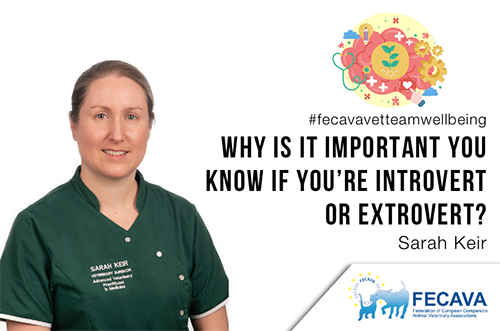
Why is it important you know if you’re introvert or extrovert?
I’m an introvert, and like other introverts, I feel more of a connection to animals than people; they are a lot less complicated and don’t get into small talk barring the occasional baby babbles to a cute puppy. Also, the introverted traits of quiet persistence, extended solitary study and being detail orientated are the exact traits that are selected for in the vet school selection criteria. It was a revelation to me to find out about introversion and extroversion and realise I am strongly introverted. It was so important because it highlighted to me how I should look after myself, to recharge my batteries and to stop fighting my innate tendency to quiet time alone with a book over going out and being social.
Having talked with others that perform behavioural analysis in the veterinary profession, they estimated that at least 70% of the profession (in the UK) are strongly introverted as compared to an estimated a third of the general population. This is a very close match with the quoted 70-80% of introverted veterinarians in this article. If you know a bit about introverts and actually understand where we’re coming from, the proportion of introverted vets isn’t too surprising.
Damaging myths and preconceptions
We have a problem because if the pervasive myth (even among introverts themselves) is that introverts don’t get on with people, and yet we work in a people-servicing industry (that happens to have animals as the medium of the service), then the greatest proportion of our profession is misunderstood and so can’t be receiving the support they need for them to give their best. No wonder that some feel that the job doesn’t meet their expectations, when we believed – and were taught – that we were there for the animals and then found out that the job is mostly about people. We are put in a busy, highly populated, client-facing, fast-paced working environment that is completely different to vet school learning, solitary study, and dealing mostly with animals. It is too easy to love the work but quickly come to hate the job; simply the change of pace from academia to the “real world” is draining enough, but for an introvert who values personal space and time to reflect, it’s a devastating body-blow.
There are many other widely held myths surrounding introverted people that have no basis in fact:
– Introverts don’t like people and have difficulty building relationships;
– Introverts are quiet, shy and socially awkward;
– You can tell if someone is an introvert immediately you meet them;
– Introverts lack confidence and don’t make good leaders;
– Introverts aren’t fun and are too serious;
– There is something wrong with introverts and if they work at it they can be fixed.
The power and strength of introverts
Where you are on the introvert/extrovert scale is not based on how you act but on what situations you thrive in and get your energy from; the behaviours come as a consequence of this. Additionally, introversion-extroversion is not a binary concept; like many personality traits, it is a sliding scale with most people somewhere in the middle, though tending towards one type or the other. It can also be situational, depending on context, mood, and goals.
Being an introvert simply means we get our energy from being in situations with a great deal of personal space, and give or lose energy when around other people, whereas extroverts gain energy from their social interactions and have a lower tolerance of being alone which drains their energy.
We are good at solitary study and intense concentration; we don’t need to be around people to feel good and are especially good at creative and critical thinking which will lead to the solving of problems in this ever changing world.
Introverts are also persistent – put us to a difficult task and we will battle through – and detail orientated so great for absorbing the huge amount of information needed to be a clinical vet and using it to do good standard work-ups or cases. Introverts also tend to be good listeners for deep and meaningful conversations as they think things through before responding, but don’t get on with small talk.
How to look after yourself as an introvert
The best way of thinking about introverts and social interactions is thinking of tokens – introverts spend a token for each interaction and extroverts gain them – and so allowing time for them to recharge away from people if they choose is vital. Knowing where you are on the introvert-extrovert scale is important so you know how to look after yourself and manage your energy.
– Break times are super important times when introverts can disengage from people so they need to be quiet times. If the practice environment is too noisy, try sitting in your car for your break or taking a walk.
– Make sure you decompress between periods of client-facing sessions. This could even be taking 5 minutes in a quiet room (the toilet, if nowhere else) and doing some breathing exercises. It also means you need to plan your time off to allow decompression away from people rather than requiring socialising.
– Reduce back-ground noise in working areas – turn off the radio, close the doors, cover cages of barking dogs.
– For introverts, down-time needs to be planned and ring-fenced. Many introverts draw firm lines around there time as ‘work time’, ‘social time’, and ‘recharge time’ and so something that covers several of those at one time is uncomfortable. For an introverts, work time plus social time or social time plue recharge time are not good combinations. Make sure you pre-plan how you need to spend your time so you are your best at work and outside work.
– Request meetings are kept small or one-to-one and are preplanned so the introvert can think and respond and are pre-scheduled not short or no notice.
– Introverts tend towards conflict avoidance which means we don’t speak up when we need to say something to protect ourselves, such as our boundaries, or our values being compromised. Make sure you realise this innate tendency and work on your self-worth and confidence in upholding our boundaries and values.
– Introverts tend towards perfectionism because the trait makes us pay more attention to detail. It’s very importance to realise and understand that while it may be very useful, it can be taken to a damaging excess or used in maladaptive ways.
– As introverts we spend a lot of time in our own heads, talking to ourselves. Make sure this doesn’t stray too much into negative rumination. Coupled with the tendency to perfectionism this can spiral down into continual self-criticism (leading to imposter syndrome and anxiety) without some external checks and balances. It’s good to have someone that can check in on your thoughts – a partner, coach or clinical supervisor is ideal for this.
– Try to find tasks that play to your introvert strengths and allow you to be ‘in flow’. Tasks such as writing, researching and working up cases are more peaceful and solitary. For me, ultrasound works well as it is performed in a dark, quiet room with minimal human interactions!
Whether you are an introvert, or know introverted friends and colleagues, I hope this article will help you optimise your needs for recharging and self-care. We need to look at providing our introverted colleagues and ourselves with environments we can thrive in, not just survive.
Read more on my blog HERE and coming soon at www.thecontented.vet If you want to read more about introversion, I highly recommend the book ‘Quiet’ by Susan Cain.
Leave a replyAbout Sarah Keir
Sarah Keir is an experienced small animal primary-care veterinarian, currently providing peripatetic medicine and ultrasound services in the South-East of England. As well as medicine, Sarah’s interests lie in non-clinical aspects of the veterinary profession, including leadership and quality improvement, leading to writing her blog www.sarahthevet.com and coming soon at www.thecontented.vet, curated support for the profession. Sarah recently reconnected with her crafting passions as a way of introducing mindful practice into her life and give her brain something other than ‘vet’ to concentrate on. She usually has a crafting kit in her bag to fit in some crafting therapy wherever she is.

Spot on with this write-up, I really suppose this web site needs much more consideration. I’ll most likely be again to read far more, thanks for that info.
Reply